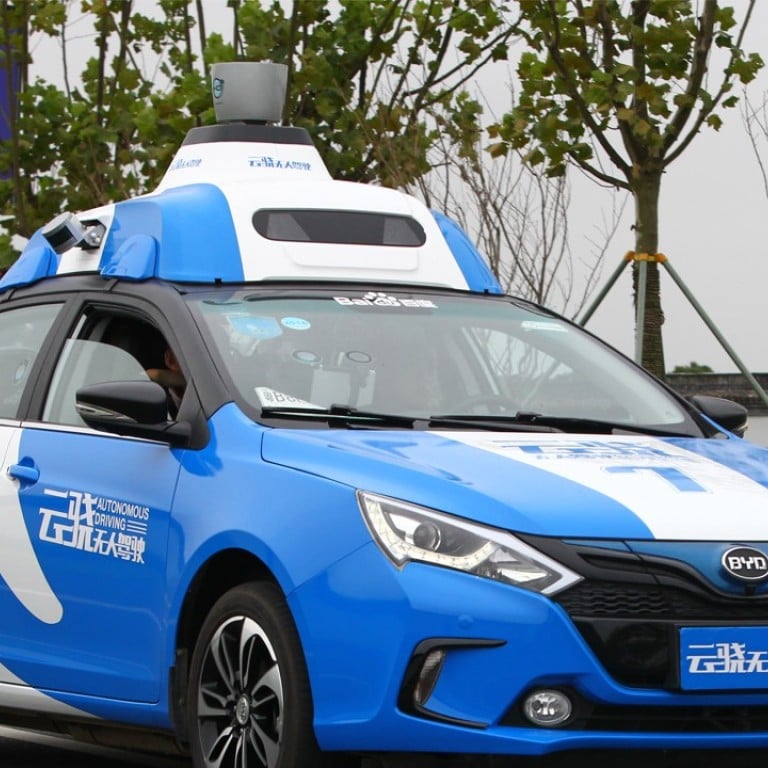
Beijing gives Baidu go-ahead to test self-driving cars as US reviews safety after Uber fatal crash
China and US are locked in a race to develop autonomous vehicles. Beijing issued the first license for a self-driving car to Baidu, days after an Uber autonomous vehicle killed a pedestrian in the US
Beijing gave the long-awaited go-ahead to Baidu to conduct open-road tests for its autonomous vehicles, days after a self-driving Uber car failed to slow down and killed a 49-year-old woman in the US.
Baidu, named by the Chinese government to a national team of so-called artificial intelligence (AI) champions, is the only company to receive the first batch of five number plates to conduct the trial. The Beijing-based company has been tasked to spearhead the development of self-driving cars and is seeking to build the vehicular equivalent of the Android operating system for smartphones.
Beijing joins Shanghai in allowing car companies to test their self-driving vehicles under real-world traffic conditions, a step that’s crucial for the machines to learn and calibrate their responses. Before this, car companies have tested their vehicles on closed circuits or very secluded areas where there are few if any cars and pedestrians, to minimise the potential for accidents.
Autonomous driving is one of the areas where China and the US are competing for leadership, part of a broader contest for supremacy in the next generations of technology that is revolutionising the way people work, play and live. Self-driving cars are increasingly seen as an amalgamation of the latest technologies, including 5G, manufacturing and new energy, and the holy grail of applied technology because they must prove to be safe in sometimes chaotic, unpredictable real-world conditions.
In December, the National Development and Reform Commission, China’s top economic planning agency, unveiled a three-year plan making the development of smart cars a national priority. Underpinned by AI, the backbone technology driving the so-called fourth industrial revolution, autonomous driving is expected to generate US$7 trillion in market value by 2050, according to an earlier report by Intel.
In Beijing, Baidu will be testing level-three autonomous car technology that allows vehicles to take full control under certain operating conditions. That is one notch higher than Tesla’s Autopilot function. Level five autonomy would be fully self-driving cars from point to point under all conditions without human intervention.
The death of Elaine Herzberg, who was hit by a Uber self-driving car while crossing the street in Tempe, Arizona, has cast a pall on the technology. It is thought to be the first an autonomous car has been involved in a fatal collision.
Uber suspended its self-driving car tests in all North American cities after the accident. Toyota Motor also temporarily suspended its autonomous driving system on US roads following the Uber crash. NuTonomy, a self-driving car start-up, halted its trials in Boston.
China, though, is going ahead with the self-driving tests.
“It was a disheartening isolated case,” Yu Kai, the former deputy managing director of Baidu Research and founder of the company’s Institute of Deep Learning, said in a social media posting. “Just as the bumpy roads in the earlier days of aviation, development of self-driving technologies won’t be a smooth success.”
A spokesman for NIO, one of two companies that received permission from Shanghai to conduct road tests, also confirmed that the open road tests in Shanghai are “proceeding as usual”.
More test fields and detailed industry guidelines are also under way in the country, according to remarks made by transport minister Li Xiaopeng earlier last month. Open-road tests for autonomous cars are advised to avoid peak rush hours and withhold from extreme weathers of rain, snow or frog, according to guidelines released by the Beijing Municipal Commission of Transport on Thursday.


